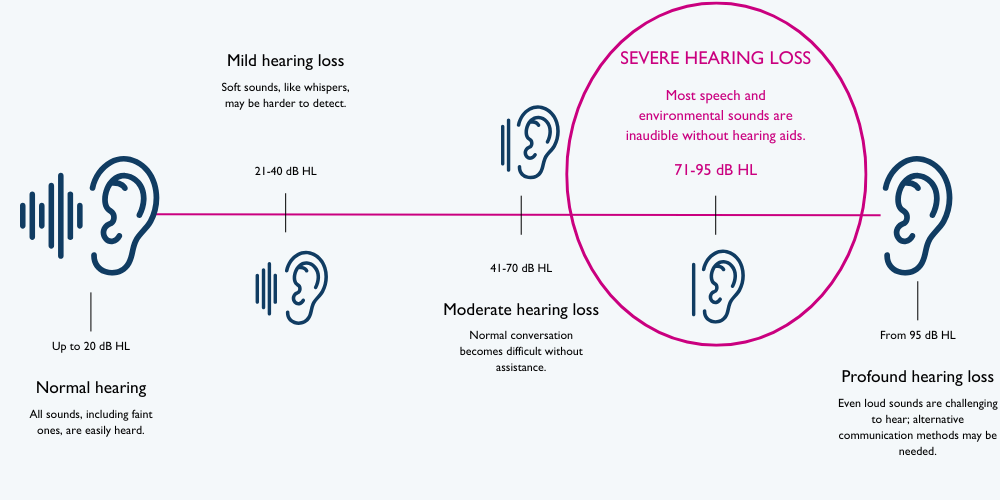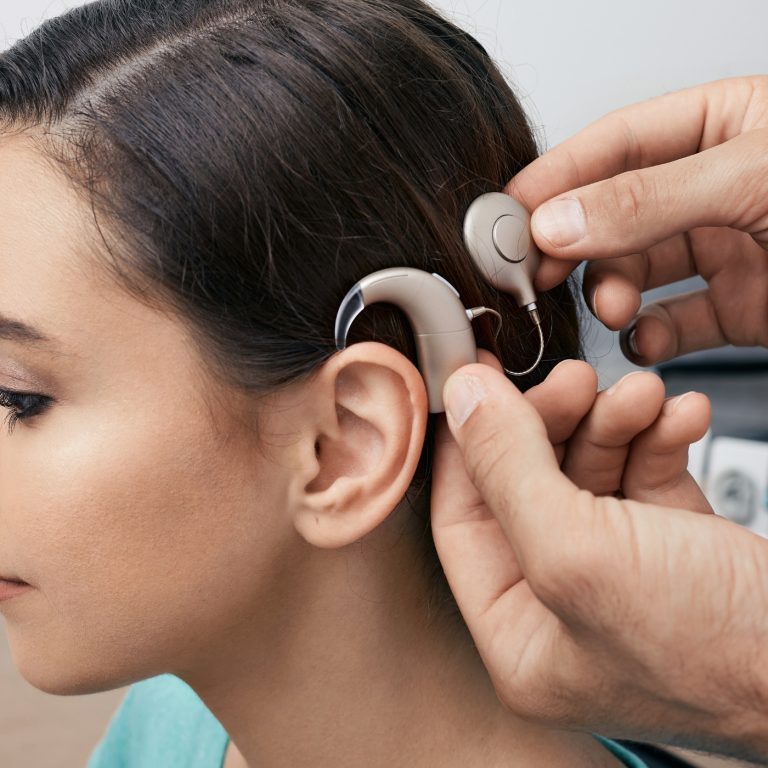Hearing loss is one of the most common health conditions and can affect anyone of any age. Hearing loss is measured in different severities ranging from mild to profound. Severe hearing loss is the second highest level of hearing loss.

Hearing loss is one of the most common health conditions and can affect anyone of any age. Hearing loss is measured in different severities ranging from mild to profound. Severe hearing loss is the second highest level of hearing loss.
Hearing loss is measured by the quietest level of sounds you can hear. This is known as your threshold and is measured in decibels (dB). Different thresholds categorise your level of hearing loss. The different levels are normal (no impairment), mild, moderate, severe, and profound.
Severe hearing loss typically has a threshold of 71-95 dB. For reference, 70dB is the average volume of a vacuum cleaner at a distance of 1 metre, while 90dB is the average volume of a jackhammer at about 15 metres. So if you’re unable to hear sounds quieter than those things, it’s likely you have severe hearing loss.

It’s not always easy to tell when you have hearing loss at first, as it’s usually a slow process that happens over time.
Some common symptoms of hearing loss include:
There are many causes of hearing loss. Some happen over time, such as presbycusis (age-related hearing loss), and others can happen suddenly, such as with noise-induced hearing loss. Some types might be treatable, and others are permanent.
If you suspect you have hearing loss, it’s important to see an audiologist as soon as possible. Severe hearing loss is diagnosed by your audiologist, who will perform a range of different tests to determine the exact cause of your hearing loss. They will perform an audiometry test (to determine how well you hear certain pitches), along with an examination of the outer ear to ensure it is healthy and a functionality test of the middle ear to determine if there are any blockages or issues. By cross-referencing this information with your patient history, they can help to determine your exact type of hearing loss as well as the severity.

Treatment of your hearing loss will depend on the cause. Some types of hearing loss can be treated, such as those caused by infections, by treating the root cause (provided you treat it soon enough). Other types of hearing loss, such as age-related hearing loss and noise-related hearing loss, are often permanent and will need management. Medical treatments for profound hearing loss include surgical options like cochlear implants (surgically implanted devices which filter sound waves directly into the cochlear nerve via an external listening device) which have strict criteria in determining who is eligible.
Hearing aids are the most common treatment for severe hearing loss. Having a pair of hearing aids fitted can greatly improve the quality of life for someone with severe hearing loss. There are a few different types of hearing aids suitable for more severe levels of hearing loss:
Yes and no. Preventative care can help preserve your hearing in some cases but not in others. Make sure you’re not listening to music or the TV too loud, and wear hearing protection in loud environments such as working with machinery or at concerts. Attend regular hearing assessments, particularly if you have a personal or family history of hearing loss, to help monitor your hearing health and catch any issues early.
Just because you have hearing loss doesn’t mean you can’t live a good and fulfilling life. You may need to adopt some different communication techniques, such as sign language, and utilise assistive listening devices, which are designed to help people who struggle to hear audio in difficult environments. You may find that you need to seek extra support from hearing care professionals and support groups which can help you come to terms with your hearing loss and offer advice and encouragement.
Living with hearing loss can be challenging, but with the help of treatments like hearing aids, you can regain a lot of quality of life. The Hearing Care Partnership is here to support you throughout your hearing loss journey. If you’re worried about your hearing, we recommend booking a free hearing test for a comprehensive hearing check.